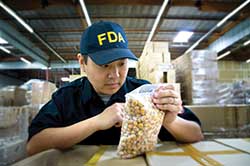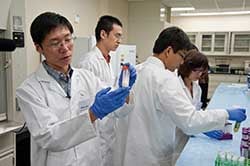Safe Imports
FOOD SAFETY & QUALITY
Imported food comes into the United States from more than 150 countries, 300,000 foreign facilities, and 130,000 importers and accounts for about 15% of the U.S. food supply, including about 50% of fresh fruits, 20% of fresh vegetables, and 80% of seafood, according to the U.S. Food and Drug Administration (FDA). All imported foods are regulated by the FDA except most meat and poultry products, which are regulated by the U.S. Dept. of Agriculture’s Food Safety & Inspection Service.
 The Food Safety Modernization Act (FSMA) was signed into law on January 4, 2011, to enable the FDA to better protect the public health by focusing more on preventing food safety problems rather than reacting to them after they occur. To implement the law, the FDA has been proposing regulations (see www.regulations.gov), including two proposals issued on July 29, 2013, relating to imported foods: “Foreign Supplier Verification Programs for Importers of Food for Humans and Animals” and “Accreditation of Third-Party Auditors/Certification Bodies to Conduct Food Safety Audits and to Issue Certifications.”
The Food Safety Modernization Act (FSMA) was signed into law on January 4, 2011, to enable the FDA to better protect the public health by focusing more on preventing food safety problems rather than reacting to them after they occur. To implement the law, the FDA has been proposing regulations (see www.regulations.gov), including two proposals issued on July 29, 2013, relating to imported foods: “Foreign Supplier Verification Programs for Importers of Food for Humans and Animals” and “Accreditation of Third-Party Auditors/Certification Bodies to Conduct Food Safety Audits and to Issue Certifications.”
The proposals would require importers to verify that their foreign suppliers have adequate preventive controls in place to ensure that the food they produce is safe and would establish a program through which qualified third parties can certify that the foreign food facilities comply with U.S. food safety standards. Imported foods with a known food safety risk would have to be accompanied by a certificate or other assurance of compliance to enter the United States, and the FDA would establish a voluntary program that provides for expedited review and entry of foods from participating importers offering food from certified facilities. The FDA could refuse entry into the United States of food from a foreign facility if the facility or the country it is located in refuses to allow the FDA to inspect the facility.
Under the foreign supplier verification proposal, importers would be required to have a plan for imported food, including identifying hazards associated with each food that are reasonably likely to occur, and to provide adequate assurances that the identified hazards are being adequately controlled. Under the accreditation of third-party auditors proposal, the FDA would establish a program to recognize accreditation bodies, based on such criteria as competency and impartiality. The accreditation bodies, which could be foreign government agencies or private companies, would in turn accredit third-party auditors to audit and issue certifications for foreign food facilities and foods.
The deadline for comments on both proposals is November 26, 2013. Although the final rule would become effective 60 days after publication, the FDA is proposing to give importers a compliance deadline of 18 months after publication so that they can make necessary changes to be in compliance with the requirements.
Building Foreign Capacity
The FSMA directed the FDA to develop a comprehensive plan to expand the technical, scientific, and regulatory food safety capacity of foreign governments and food industries that export foods to the United States. On February 28, 2013, the FDA issued the “International Food Safety Capacity-Building Plan,” which it will implement over the next five years, provided that there is adequate funding. The plan’s four key goals are to ensure efficiency of the FDA’s Foods and Veterinary Medicine Program, increase effectiveness through evidence-based decision making, support the exchange of information between the FDA and foreign government agencies or other entities, and enhance technical assistance and capacity-building in food. The objectives of the fourth goal are to work with partners to develop and deliver food safety training programs focused on best practices and global food safety principles, train foreign governments and food producers on U.S. requirements for safe food, develop recommendations on whether and how to harmonize requirements under the Codex Alimentarius, and support provisions for the multilateral acceptance of laboratory methods and testing and detection techniques.
 The FDA has been partnering with training institutions and domestic and international laboratory networks to conduct outreach and education. In September 2011, it partnered with Waters Corp. (www.waters.com) to establish an International Food Safety Training laboratory (IFSTL) focused on building the capacity of laboratories to ensure the safety of the U.S. food supply and harmonizing analytical methods worldwide. Located at the University of Maryland’s Joint Institute of Food Safety and Applied Nutrition (JIFSAN) (http://ifstl.jifsan.umd.edu), a multidisciplinary research and education program jointly administered by the university and the FDA, the laboratory provides training on the application of fit-for-purpose analytical methods for monitoring compliance with food safety standards. Waters provided funds for construction of the laboratory, equipped the facility with state-of-the-art instruments, and provides continued support for equipment needs and operating expenses.
The FDA has been partnering with training institutions and domestic and international laboratory networks to conduct outreach and education. In September 2011, it partnered with Waters Corp. (www.waters.com) to establish an International Food Safety Training laboratory (IFSTL) focused on building the capacity of laboratories to ensure the safety of the U.S. food supply and harmonizing analytical methods worldwide. Located at the University of Maryland’s Joint Institute of Food Safety and Applied Nutrition (JIFSAN) (http://ifstl.jifsan.umd.edu), a multidisciplinary research and education program jointly administered by the university and the FDA, the laboratory provides training on the application of fit-for-purpose analytical methods for monitoring compliance with food safety standards. Waters provided funds for construction of the laboratory, equipped the facility with state-of-the-art instruments, and provides continued support for equipment needs and operating expenses.
Paul Young, Senior Director of Food & Environmental Business Operations at Waters, said that capacity building is critical to improving food safety as international trade continues to increase and that governments that are signatories to international trade agreements agree to provide technical assistance to their trading partners when needed. Joining Waters after 25 years in regulatory agencies in Ireland, Young discussed with the FDA the establishment of a dedicated facility where interested people could come for hands-on laboratory-based training year round. The FDA agreed that there was a demand for such a facility, and Waters provided financial support and instrumentation for the IFSTL at JIFSAN and for a second IFSTL at the Food and Environmental Research Agency in York, UK, under the auspices of the Dept. of Environment, Food, and Rural Affairs. Waters is in discussion with regulators in China for a third IFSTL and is in negotiations for two additional facilities in other countries.
--- PAGE BREAK ---
Each IFSTL teaches food safety testing, offering short courses on specific methods of analysis that are appropriate for their purpose. A lot of different parameters influence whether a method is fit for its purpose, Young said; among them are sensitivity, repeatability of the method, the influence of different matrices, and the conditions under which the test is run. Basically, fit-for-purpose methods are those that are capable of generating results with a high degree of confidence that permit the correct decision regarding a food’s compliance status. Such methods must be capable of detecting hazards reliably, finding contaminants below regulatory limits, and discriminating between the contaminant and any potential interferences.
Training at an IFSTL focuses on methods rather than specific instrumentation—Waters and other instrument suppliers provide training on their instruments independently of the IFSTL. Each IFSTL also provides a forum for sharing best practices, discussing issues, and having ongoing direct communication with instructors and other trainees at any time.
Tracing Products
The ability to trace products and ingredients from the farm to consumers is obviously an important aspect of food safety—one cannot verify foreign suppliers without having the ability to trace the foods back to them. On July 14, 2013, the Institute of Food Technologists announced the launch of its Global Food Traceability Center (www.globalfoodtraceability.org) intended to serve as an authoritative, scientific, and unbiased source on traceability. The center will be a focal point where industry, academic institutions, government, foundations, and consumer groups can discuss, collaborate, conduct research, adopt best practices, and promote implementation of practical traceability solutions.
IFT Book Addresses Import Safety
Improving Import Food Safety, a book in the IFT Press series published by the Institute of Food Technologists and Wiley-Blackwell (www.wiley.com/go/ift), provides information on the food safety programs of national governments, the food industry, and the testing industry. Edited by Wayne Ellefson, Lorna Zach, and Darryl Sullivan, the book features chapters written by authors from the United States, Latin America, Europe, and Asia.
The book notes that global sourcing of foods and ingredients, while providing variety and diversity, poses significant risks. Programs that regulate food Safety and quality in countries around the world vary in their scope and effectiveness, with many being underfunded. Developing countries may lack the expertise, laboratory resources, and inspection programs to adequately promote the safety of foods, and lack of documentation or traceability in the exporting country can exacerbate the situation.
Among other topics, the book discusses the difficulty in policing imports; the legal and regulatory systems in the European Union, the United States, and China; global approaches to fraud; and potential strategies for dealing with import challenges.
Symposium and Webcast Discuss Import Proposals
During the IFT annual meeting symposium “Progress in Implementing the 2011 Food Safety Modernization Act (FSMA) for Food Imports into the U.S.A.: Impact on Global Supply Chains” on July 14, 2013, Luis A. Mejia, Adjunct Associate Professor at the University of Illinois, presented a review of the progress achieved on the FSMA and the implications for the food industry; Cory Bryant, Assistant Country Director for Foods in the FDA’s China Office, discussed the impact that the FSMA will have on imports and provided an update on the activities of the China office to support implementation and enhance food safety; Ricardo Carvajal, Director in the law firm of Hyman, Phelps & McNamara, Washington, D.C., discussed compliance challenges likely to be presented by the FDA’s implementation of provisions of the FSMA that address preventive controls and foreign supplier verification; and Rebeca López-Garcia, Principal at LOGRE International Food Science Consulting, Mexico City, Mexico, addressed the major issues faced by foreign suppliers trying to comply with the FSMA’s requirements.
A webcast on August 15, 2013, “Foreign Supplier Verification Programs for Importers: FDA and Industry Expert Insights,” sponsored by Solutions Associates Consulting Inc. and chaired by William Fisher, IFT’s Vice President of Science & Policy Initiatives, featured discussions by Edgar Asebey-Birkholm, FDA Practice Group Manager at Roetzel & Andress, and Domenic Veneziano, Director of the FDA’s Division of Import Operations. The ondemand webcast is available via www.ift.org/knowledge.
 Neil H. Mermelstein,
Neil H. Mermelstein,
a Fellow of IFT, is Editor Emeritus of Food Technology
[email protected]


